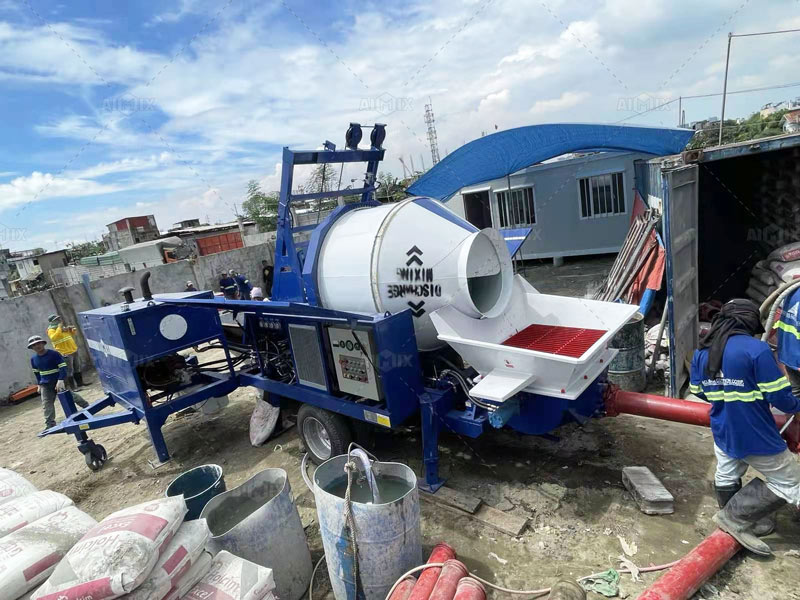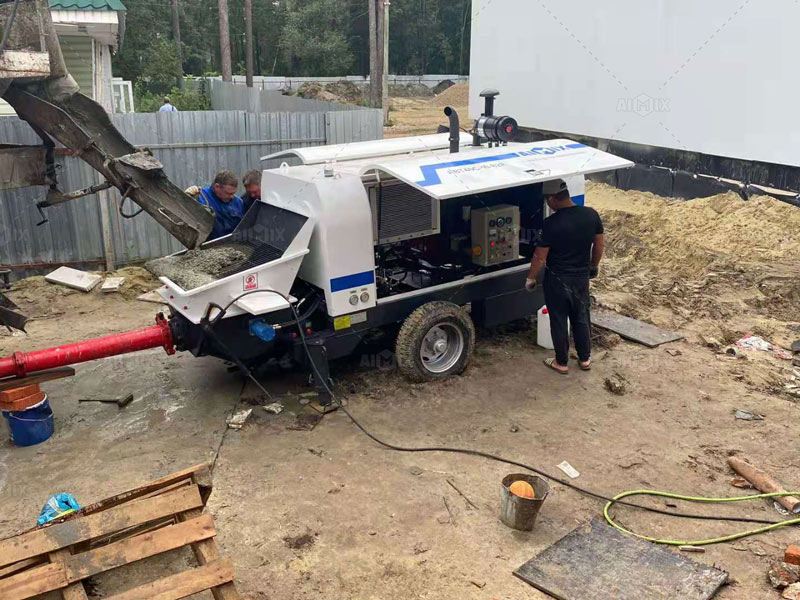In the construction industry, efficiency and productivity are essential for project success. One piece of equipment that has revolutionized construction projects is the concrete pump. These machines have made it easier and faster to transport large volumes of concrete to precise locations on a construction site, reducing the need for manual labor and traditional methods. However, when selecting a concrete pump, understanding its maximum capacity is crucial to ensuring it meets the specific needs of your project. Whether you are looking at concrete pump prices(bomba de concreto precios), exploring options for a concrete pump for sale, or considering a trailer concrete pump, the capacity of the machine will determine how efficiently it can complete the task at hand.

Understanding the Role of Concrete Pumps
Before delving into the capacity of a modern concrete pump, it’s important to understand the role these machines play in construction. A concrete pump is designed to transport liquid concrete from the mixing plant or truck to the desired location on the site. It eliminates the need for wheelbarrows and other manual methods of transporting concrete, which significantly reduces labor costs and speeds up the process.
There are two main types of concrete pumps: boom pumps and trailer concrete pumps(AIMIX bombas estacionarias de hormigón). Boom pumps are larger machines equipped with a robotic arm that can reach high or hard-to-access areas, while trailer pumps are smaller, more portable machines typically towed by a vehicle. Trailer pumps are ideal for medium-sized projects where flexibility and mobility are essential.
Maximum Capacity of Concrete Pumps
What Determines the Capacity?
The capacity of a concrete pump refers to the amount of concrete it can pump per hour. This is measured in cubic meters per hour (m³/h). The capacity of a pump is influenced by several factors, including:
- Pump Type: Different types of pumps, such as boom pumps or trailer pumps, have varying maximum capacities. Boom pumps generally have larger capacities due to their size and power, while trailer pumps are more suited for medium-scale projects.
- Power and Engine Size: The engine size and power output of the pump also play a role in determining how much concrete it can transport in a given time.
- Concrete Type: The consistency and viscosity of the concrete mix can affect how easily it can be pumped. Thicker mixes may require more power to pump, reducing the machine’s overall capacity.
- Distance and Height: The distance and height that the concrete needs to be pumped will influence the capacity. Pumping concrete vertically, for example, can reduce the overall capacity due to the increased effort required.
Maximum Capacity for Trailer Concrete Pumps
A trailer concrete pump is designed for versatility and portability. Although they tend to have smaller capacities compared to boom pumps, trailer pumps are still highly effective for many construction projects.
- The maximum capacity of modern trailer pumps ranges from 30 to 100 cubic meters per hour (m³/h).
- Smaller models with capacities around 30-50 m³/h are ideal for residential projects or small commercial jobs.
- Larger models with capacities up to 100 m³/h are better suited for bigger projects, such as high-rise buildings or large commercial developments.
These pumps are typically powered by diesel engines and are capable of transporting concrete over long distances, making them ideal for jobs that require precision and flexibility.

Key Factors to Consider When Choosing a Concrete Pump
Project Size and Scope
When deciding on a concrete pump, it’s important to assess the size and scope of your project. For smaller residential projects, a pump with a capacity of 30-40 m³/h may be sufficient. However, larger projects, such as commercial or industrial construction, may require a pump with a higher capacity, potentially up to 100 m³/h.
Concrete Pump Price
One of the most important factors when purchasing a concrete pump is the concrete pump price. The price of a concrete pump varies depending on the machine’s capacity, features, and type. Trailer pumps tend to be more affordable than boom pumps, making them a popular option for contractors who need flexibility on a budget.
- A basic trailer concrete pump with a capacity of 30-50 m³/h may cost between $25,000 to $50,000.
- Larger models with capacities of 60-100 m³/h can range from $50,000 to $100,000 or more, depending on the brand and features.
When considering concrete pump for sale(bomba de hormigón en venta) listings, be sure to compare models based on their capacity, engine size, and overall performance to get the best value for your money.
Durability and Maintenance
In addition to capacity and price, the durability of the pump should also be a key consideration. Look for models made with high-quality materials that can withstand the rigors of a construction site. The durability of a pump can affect its long-term cost-effectiveness, as machines that require frequent maintenance or repairs can lead to increased operational costs.
Regular maintenance is essential for ensuring that the pump operates at its full capacity throughout its lifespan. Checking for wear and tear on key components such as the hydraulic system, pistons, and valves will help extend the life of the pump and reduce downtime on the job site.
Benefits of High-Capacity Concrete Pumps
Increased Efficiency
The main advantage of using a high-capacity concrete pump is the increase in efficiency. By pumping large amounts of concrete in a short time, these pumps reduce the time required to complete a project, allowing contractors to stay on schedule. This is especially beneficial for large-scale projects that require continuous concrete pouring.
Cost Savings
Investing in a concrete pump with a higher capacity can lead to significant cost savings over time. While the initial investment may be higher, the reduced need for labor and the ability to complete projects faster can offset these costs. Additionally, high-capacity pumps are less likely to experience delays or breakdowns, leading to fewer costly repairs. Why not find out more: https://aimixgrupo.com/bomba-de-concreto-estacionaria/
Conclusion
The maximum capacity of a modern concrete pump can vary depending on the type of pump, engine power, and the specific needs of a construction project. For most medium to large-scale projects, a trailer concrete pump with a capacity of 30-100 m³/h is more than sufficient. These machines offer versatility, mobility, and affordability, making them a popular choice for contractors across the industry.
When looking for a concrete pump for sale, it’s important to balance capacity with other factors such as durability, maintenance needs, and concrete pump price. By investing in a high-quality concrete pump, you can improve efficiency, reduce labor costs, and complete projects faster, ensuring long-term success for your construction business.